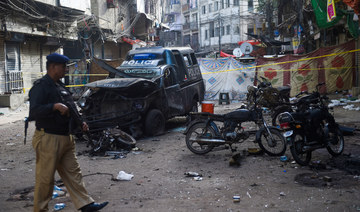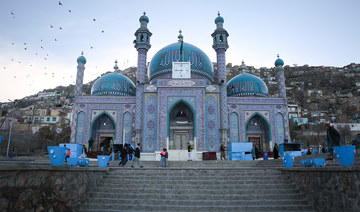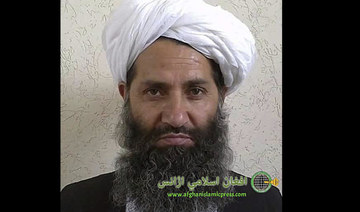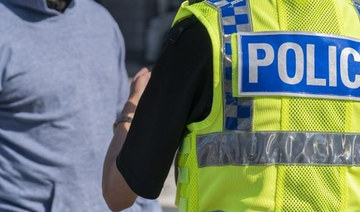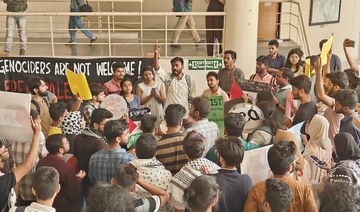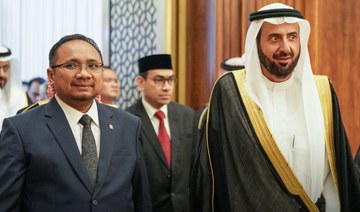FRANKFURT: German police staged nationwide raids on Wednesday and arrested 25 people suspected of belonging to a far-right “terror cell” plotting to overthrow the government and attack parliament.
Around 3,000 officers including elite anti-terror units took part in the early morning raids and searched more than 130 properties, in what German media described as one of the country’s largest police actions ever against extremists.
The raids targeted alleged members of the “Citizens of the Reich” (Reichsbuerger) movement suspected of “having made concrete preparations to violently force their way into the German parliament with a small armed group,” federal prosecutors said in a statement.
Those arrested are accused of having formed “a terrorist group by the end of November 2021 at the latest, which had set itself the goal of overcoming the existing state order in Germany and replacing it with their own kind of state,” they said.
Two of the 25 arrests were made abroad, in Austria and Italy.
The prosecutors in Karlsruhe said they had identified a further 27 people as suspected members or supporters of the terror network.
The Reichsbuerger movement includes neo-Nazis, conspiracy theorists and gun enthusiasts who reject the legitimacy of the modern German republic.
Long dismissed as malcontents and oddballs, the Reichsbuerger have become increasingly radicalized in recent years and are seen as a growing security threat.
Former soldiers are believed to be among the members of the recently established terror group, federal prosecutors said.
“The accused are united by a deep rejection of state institutions and the free, democratic basic order of the Federal Republic of Germany,” they said.
The suspects were aware that their plan “could only be realized by using military means and violence against state representatives,” they added.
Justice Minister Marco Buschmann praised the dismantling of the “suspected terror cell” on Twitter, saying it showed that Germany was able to defend its democracy.
Reichsbuerger followers generally believe in the continued existence of the pre-war German Reich, or empire, as it stood under the Nazis, and several groups have declared their own states.
They typically deny the authority of police and other state institutions.
According to prosecutors, the terror cell suspects believe in Reichsbuerger and QAnon conspiracy theories and are “strongly convinced” that Germany is run by a “deep state” that needs to be toppled.
They allegedly planned to appoint one of the arrested suspects, Heinrich XIII P.R., as Germany’s new leader after the coup.
He had already sought to make contact with Russian officials to discuss Germany’s “new state order” after the coup, prosecutors said.
There was however “no indication that the contact persons responded positively to his request.”
A Russian woman named as Vitalia B., who was among those arrested on Wednesday, is suspected of having facilitated those contacts, prosecutors added.
As part of the preparations for the coup, members of the alleged terror cell acquired weapons, organized shooting practice and tried to recruit new followers, particularly among the military and police, according to prosecutors.
Germany’s domestic intelligence service estimates that the Reichsbuerger scene consists of around 20,000 people.
Of those, more than 2,000 are deemed potentially violent.
Germany considers far-right terrorism the biggest threat to its security following a spate of attacks in recent years.
In April, police foiled a plot by a far-right group to kidnap the health minister.
The group was affiliated with the Reichsbuerger movement and the so-called “Querdenker” (Lateral Thinkers) group that opposed the government’s coronavirus-related shutdowns.
Germany busts far-right terror cell planning parliament attack
https://arab.news/wqt6u
Germany busts far-right terror cell planning parliament attack
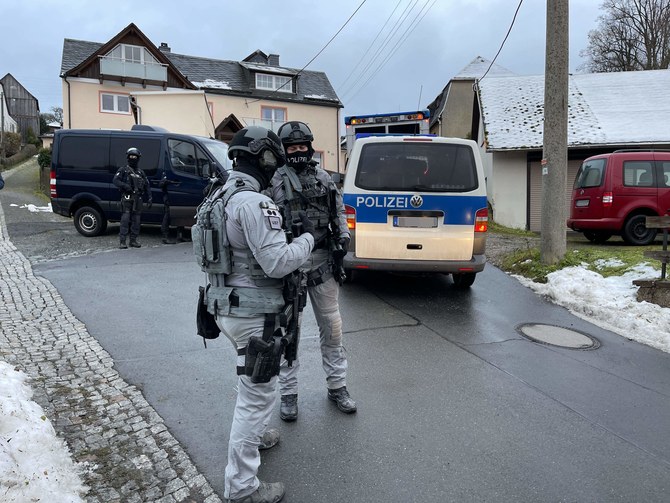
- Raids targeted alleged members of “Citizens of the Reich” (Reichsbuerger) movement
- Two of the 25 arrests were made abroad
US defends talking to Taliban in Afghanistan
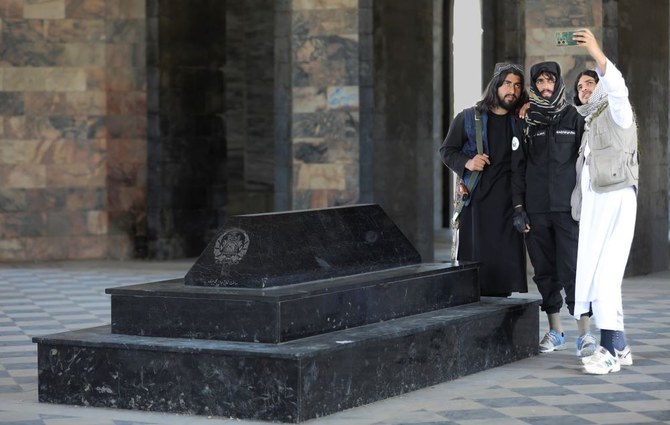
- Dialogue works in US interests, supports Afghan people, State Department says
- Taliban took power in 2021 following withdrawal of US-led coalition
LONDON: The US State Department has defended talking to the Taliban in order to serve Washington’s interests in Afghanistan and the wider region.
The department’s principal deputy spokesperson, Vedant Patel, told reporters that talking with the group not only worked in US interests but supported “the Afghan people.”
The Taliban took control of Afghanistan in 2021 following the withdrawal of US-led coalition forces and the collapse of the Western-backed Afghan government.
They have drawn significant hostility on the international stage for their repression of people, especially their treatment of women and girls, limits on education and reintroduction of violent punishment.
Some fear engaging with the Taliban could lend them legitimacy, but Patel said dialogue between the group and the US “allows us to speak directly with the Taliban, and it’s an opportunity for us to continue to press for the immediate and unconditional release of US nationals in Afghanistan, including those who we have determined to be wrongfully detained.”
“We’ll also use those opportunities to directly talk about the Taliban’s commitments to counterterrorism and of course, as always, human rights is also on the agenda,” he said.
British police officer pleads guilty to terror charges for showing support for Hamas
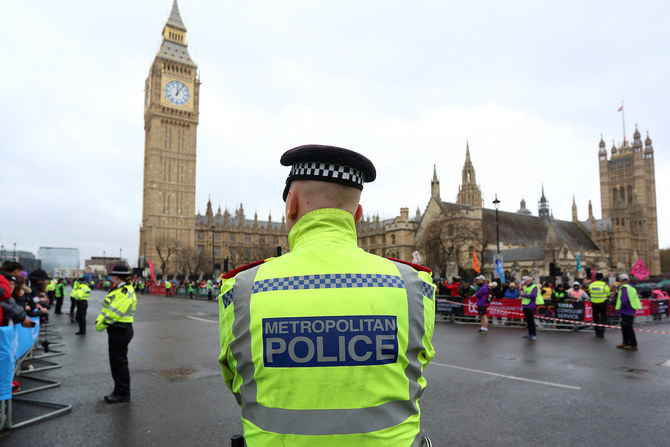
- Adil pleaded guilty in Westminster Magistrates’ Court to two counts of publishing an image in support of a proscribed organization in violation of the Terrorism Act
- Two other police officers who were concerned by the images reported Adil to superiors
LONDON: A British police officer pleaded guilty Thursday to terror charges for showing support on social media for Hamas, which is designated a terror group and banned in the UK.
West Yorkshire constable Mohammed Adil admitted sharing two images on WhatsApp supporting the group three weeks after Hamas and other Palestinian militants stormed into Israel on Oct. 7 and killed about 1,200 people and seized some 250 hostages.
Adil, 26, pleaded guilty in Westminster Magistrates’ Court to two counts of publishing an image in support of a proscribed organization in violation of the Terrorism Act.
In messages shared on WhatsApp stories with nearly 1,100 contacts, Adil posted images of a fighter wearing a Hamas headband, prosecutor Bridget Fitzpatrick said.
“Today is the time for the Palestinian people to rise, set their paths straight and establish an independent Palestinian state,” an Oct. 31 post said, apparently quoting the leader of Hamas’ military wing.
A second post on Nov. 4 was said to quote a Hamas military spokesperson.
Two other police officers who were concerned by the images reported Adil to superiors, Fitzpatrick said. He was arrested in November and has been suspended from the force.
“I accept that at the time of the offending you were of good character,” Chief magistrate Paul Goldspring told Adil, though he said he may impose a prison term when he is sentenced June 4.
Adil was released on bail.
California police move in to dismantle pro-Palestinian protest camp at UCLA

- The pre-dawn police crackdown at UCLA marked the latest flashpoint for mounting tensions on US college campuses
- Live TV footage showed about six protesters under arrest
LOS ANGELES: Hundreds of helmeted police muscled their way into a central plaza of the University of California at Los Angeles early on Thursday to dismantle a pro-Palestinian protest camp attacked the previous night by pro-Israel supporters.
The pre-dawn police crackdown at UCLA marked the latest flashpoint for mounting tensions on US college campuses, where protests over Israel’s conduct of the war in Gaza have led to student clashes with each other and law enforcement.
Live TV footage showed about six protesters under arrest, kneeling on the ground, their hands bound behind their backs with zip-ties.
Dozens of loud explosions were heard during the clash from flash-bang charges, or stun grenades, fired by police.
Demonstrators, some carrying makeshift shields and umbrellas, sought to block the officers’ advance by their sheer numbers, while shouting, “push them back” and flashing bright lights in the eyes of the police. Others on the opposite side of the camp gave up quickly, and were seen walking away with their hands over their heads under police escort.
Around sunset on Wednesday, officers in tactical gear had begun filing onto the UCLA campus and taking up positions adjacent to a complex of tents occupied by throngs of demonstrators, live footage from the scene showed.
Local television station KABC-TV estimated 300 to 500 protesters were hunkered down inside the camp, while around 2,000 more had gathered outside the barricades in support.
But the assembled police stood by on the periphery for hours before finally starting to force their way into the encampment around 3:15 a.m. PDT (1015 GMT), tearing down barricades and arresting occupants who refused to leave. The raid was led by a phalanx of California Highway Patrol officers carrying shields and batons.
Some of the protesters had been seen donning hard hats, goggles and respirator masks in anticipation of the siege a day after the university declared the encampment unlawful.
Prior to moving in, police urged demonstrators in repeated loudspeaker announcements to clear the protest zone, which occupied a plaza about the size of a football field between the landmark twin-tower auditorium Royce Hall and the main undergraduate library.
An initial group of Los Angeles police officers who briefly entered a corner of the camp were overwhelmed by demonstrators and forced to retreat, before reinforcements arrived by the busload about an hour later.
Violent clash precedes crackdown
UCLA had canceled classes for the day on Wednesday following a violent clash between the encampment’s occupants and a group of masked counter-demonstrators who mounted a surprise assault late Tuesday night on the tent city.
The occupants of the outdoor protest camp, set up last week, had remained mostly peaceful before the melee, in which both sides traded blows and doused each other with pepper spray.
Members of the pro-Palestinian group said fireworks were thrown at them and they were beaten with bats and sticks. University officials blamed the disturbance on “instigators” and vowed an investigation.
The confrontation went on for two or three hours into early Wednesday morning before police restored order. A spokesperson for California Governor Gavin Newsom later criticized the “limited and delayed campus law enforcement response” to the unrest as “unacceptable.”
As the much-expanded police force entered the campus on Wednesday night to clear the encampment, some of the protesters were heard yelling at them, “Where were you yesterday?“
Taylor Gee, a 30-year old pro-Palestinian protester and UCLA law student, said the police action felt “especially galling” to many protesters given the slow police response a night earlier.
“For them to come out the next night to remove us from the encampment, it doesn’t make any sense, but it also makes all the sense in the world.”
Protests at schools across the US
UCLA officials said the campus, which enrolls nearly 52,000 students, including undergraduates and graduate scholars, would remain shuttered except for limited operations on Thursday and Friday.
The protests follow the Oct. 7 attack on southern Israel by Hamas militants from the Gaza Strip and the ensuing Israeli offensive on the Palestinian enclave.
Students have rallied or set up tent encampments at dozens of schools across the US in recent days, calling for an immediate ceasefire in Gaza and demanding schools divest from companies that support Israel’s government. Many of the schools have called in police to quell the protests.
The demonstrations across the country have been met with counter-protesters accusing them of fomenting anti-Jewish hatred. The pro-Palestinian side, including Jews opposed to Israeli actions in Gaza, say they are being unfairly branded as antisemitic for criticizing Israel’s government and expressing support for human rights.
The issue has taken on political overtones in the run-up to the US presidential election in November, with Republicans accusing some university administrators of turning a blind eye to antisemitic rhetoric and harassment.
Wednesday night’s police action came a day after police in New York City arrested pro-Palestinian activists who occupied a building at Columbia University and removed a tent city from the campus of the Ivy League school.
Police arrested a total of about 300 people at Columbia and City College of New York, Mayor Eric Adams said. Many of those arrested were charged with trespassing and criminal mischief.
The clashes at UCLA and in New York were part of the biggest outpouring of US student activism since the anti-racism rallies and marches of 2020.
Ninety pro-Palestinian demonstrators — students and outsiders — were arrested at Dartmouth University in New Hampshire on Wednesday, the Hanover Police Department said. They were charged with criminal trespass and resisting arrest.
Indonesia explores opportunities in Suez Canal Economic Zone

- Egypt is Indonesia’s top trade partner in the North African region
- Indonesia has lately been increasing trade engagement with Egypt
JAKARTA: Indonesia is setting its sights on cooperation with the Suez Canal Economic Zone, authorities have said after a series of ministerial-level meetings in Cairo this week.
An Indonesian delegation led by Deputy Trade Minister Jerry Sambuaga met with officials from the Suez Canal Economic Zone on Sunday to explore opportunities, as Jakarta seeks to boost exports through the vital waterway that is the shortest route between Asia and Europe.
Closer cooperation with the Suez Canal Economic Zone would help Indonesia boost its exports to Egypt, as well as other parts of Africa, the Middle East, Europe and Central Asia, Sambuaga said.
“This is in keeping with the fact that more than 8 percent of global trade goes through the Suez Canal annually … We hope that in the future, Indonesia and Egypt will have stronger cooperation and we will see an increase in the export of Indonesian goods to Egypt,” the minister added.
Southeast Asia’s biggest economy has been increasing its trade engagement with Egypt, which it sees as a gateway for exports to other African countries.
Sambuaga’s trip to Cairo followed the visit of Trade Minister Zulkifli Hasan just last year, when he signed a memorandum of understanding with Egyptian Minister of Trade and Industry Ahmed Samir to form a joint trade committee to boost commercial relations.
Earlier in March, Indonesia worked alongside Malaysia to explore the possibilities of a free trade pact between the Association of Southeast Asian Nations and Egypt.
Egypt ranks third among Indonesia’s top export destinations in the Middle East and North Africa, just after the UAE and Saudi Arabia.
With bilateral trade volume worth around $1.58 billion in 2023, Egypt is Indonesia’s top trade partner in North Africa alone. Palm oil, coffee beans, and coconut oil are some of Indonesia’s main exports to Egypt.
India, UAE mark two years of free trade with 16% growth
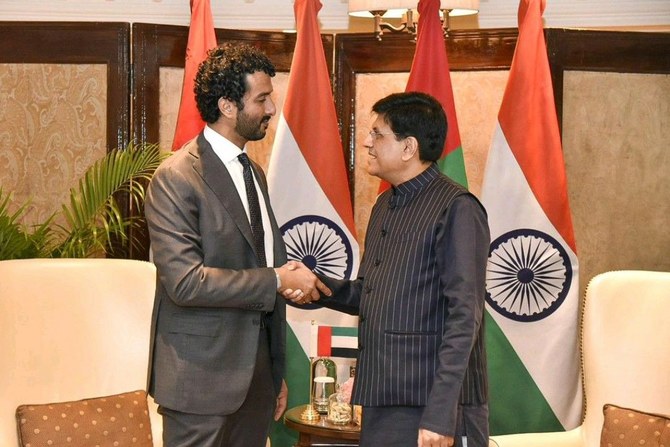
- Technology, innovation, and energy are main drivers behind the growth
- UAE ambassador welcomes increase in trade as ‘resounding success story’
NEW DELHI: A broad trade and investment pact signed by India and the UAE two years ago has boosted bilateral trade by 16 percent, with India’s top business body seeing growth, especially in the innovation, energy and technology sectors.
The Comprehensive Economic Partnership Agreement was signed by India’s Commerce and Industry Minister Piyush Goyal and UAE Economy Minister Abdulla bin Touq Al-Marri in February 2022.
It has been in effect since May 1, 2022, reducing tariffs on about 80 percent of all goods and providing zero-duty access to 90 percent of Indian exports.
The pact has since significantly advanced bilateral exchanges, as they registered a year-on-year increase of more than 16 percent, according to data from the Federation of Indian Chambers of Commerce and Industry, India’s largest and oldest trade association.
“In the first two years of CEPA’s operation, trade between the two countries has grown remarkably by 16.41 percent, showing an increase of total trade from $72.87 billion in 2021-2022 to $84.84 billion in 2022-2023,” FICCI Secretary-General S.K. Pathak told Arab News.
“Most of this growth has been registered in energy, infrastructure and construction, technology and innovation, pharma and healthcare, tourism and cultural exchanges.”
The agreement made the UAE emerge as India’s key partner in the Gulf Cooperation Council region, with both countries expecting to increase the total value of bilateral trade in non-petroleum products to over $100 billion and trade in services to $15 billion by 2030.
Citing the “growing importance of the trade relations between the two countries,” Pathak said the FICCI had “set up an office in Dubai to work closely with industry and government and support business to achieve the full benefits of CEPA.”
Supported by the UAE and Indian governments, the UAE-India CEPA Council was also established earlier this year to enhance investment, trade ties, and the implementation of the pact’s rules.
The UAE Embassy in India celebrated the second anniversary of the agreement with members of the business community in Mumbai, India’s financial hub.
UAE Ambassador Abdulnasser Al-Shaali welcomed the growth in bilateral commercial exchanges as a “resounding success story,” solidifying the long-standing economic ties between the two countries.
“Over the past two years, we have witnessed remarkable growth in bilateral trade, a testament to the immense potential that exists when our complementary strengths are harnessed effectively,” he said during the event on Wednesday.
“The CEPA has not only opened new avenues for businesses to benefit from the bilateral partnership but has also fostered deeper integration of our economies, paving the way for increased investment flows and collaboration across diverse sectors.”



